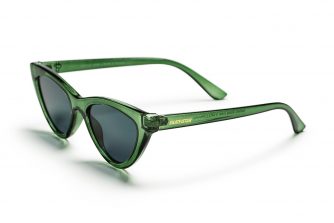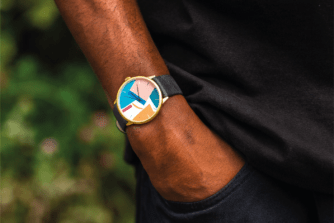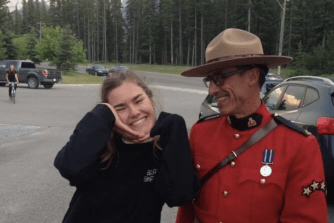We’re proud to present:’WHEN LEAST EXPECTED’, a mini-documentary by Markus Bengtsson touching on Beirut’s first skatepark: Snoubar, the city, it’s scene and the impact of skateboarding out there. This was all made possible by CHPO Brand and Make Life Skate Life and we can’t thank them enough. We have uploaded Issue 24’s ‘All Chicken No Rules’ article to accompany this video release. Featuring: Helena Long, Rem Taha, Mike Richard, Ahmad Bershalle, Nour Merhi, Arne Hillerns, Mahmoud Chanati, Samer Nuwayhid, Shield, Ali Barakat and our very own Jono Coote who wrote the article below!
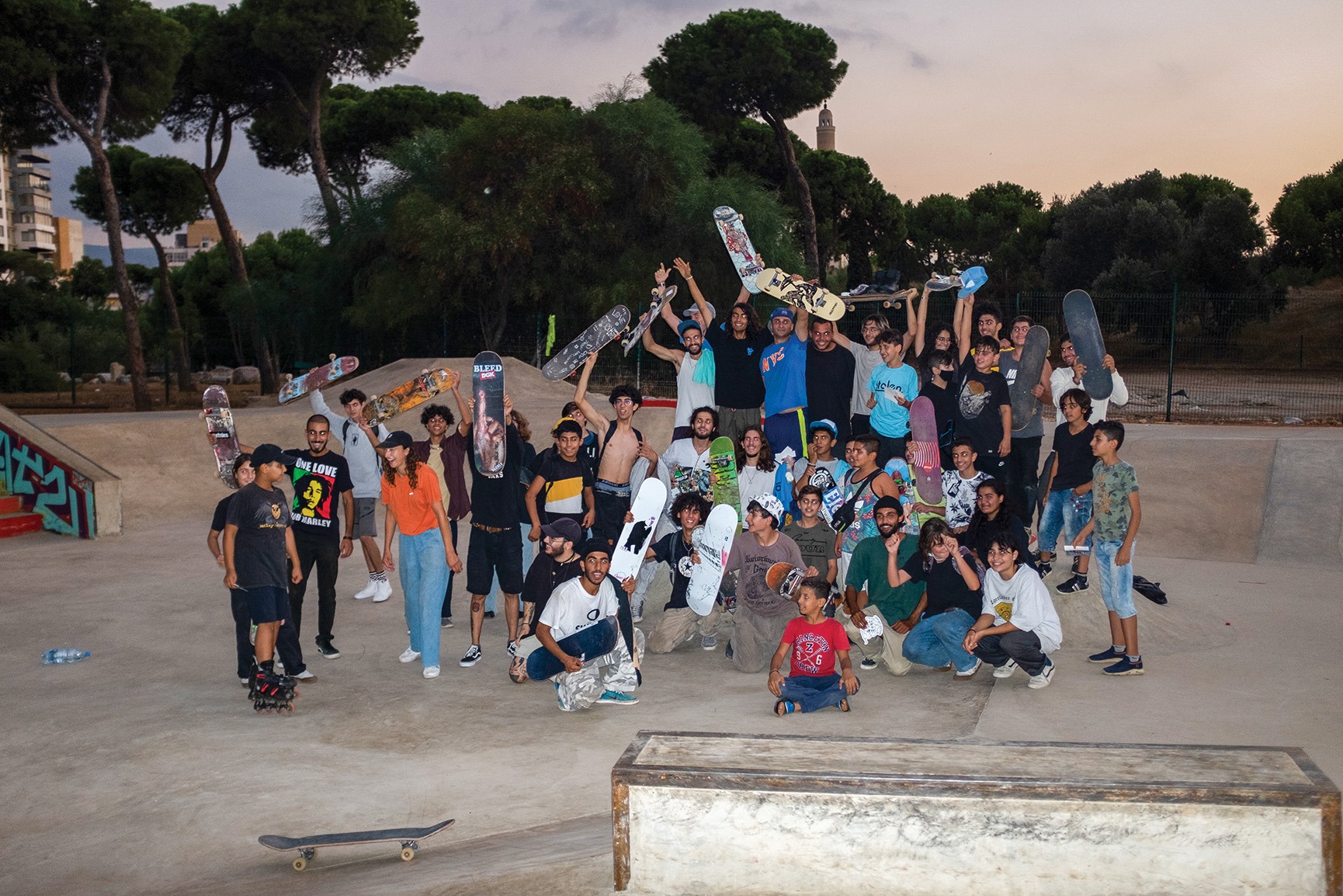
Photo by: Markus Bengtsson
Introduction & Words by: Jono Coote
Photography by: Markus Bengtsson & Jono Coote
Videography by: Markus Bengtsson
Artwork by: Viktor Telégin
In July 2021 work was completed on Beirut’s first public skatepark by the NGO Make Life Skate Life and a crew of volunteers. In October CHPO Brand, as one of the co-funders, paid a visit. With Snoubar Skatepark as a base, we explored the city streets, spoke to local skaters and attempted to ascertain where skateboarding slotted into the social milieu of a country racked by sectarian tensions and an economy in freefall. A story quickly emerged of human resilience and the positive long term impact skateboarding can have on a community, bridging as it does social and cultural barriers. This documentary shows a small portion of those skaters who took the time to speak with us, skate with us and help us make some sense of an inherently messy political and economic situation. Shukran Beirut, and everyone that showed us such incredible hospitality.
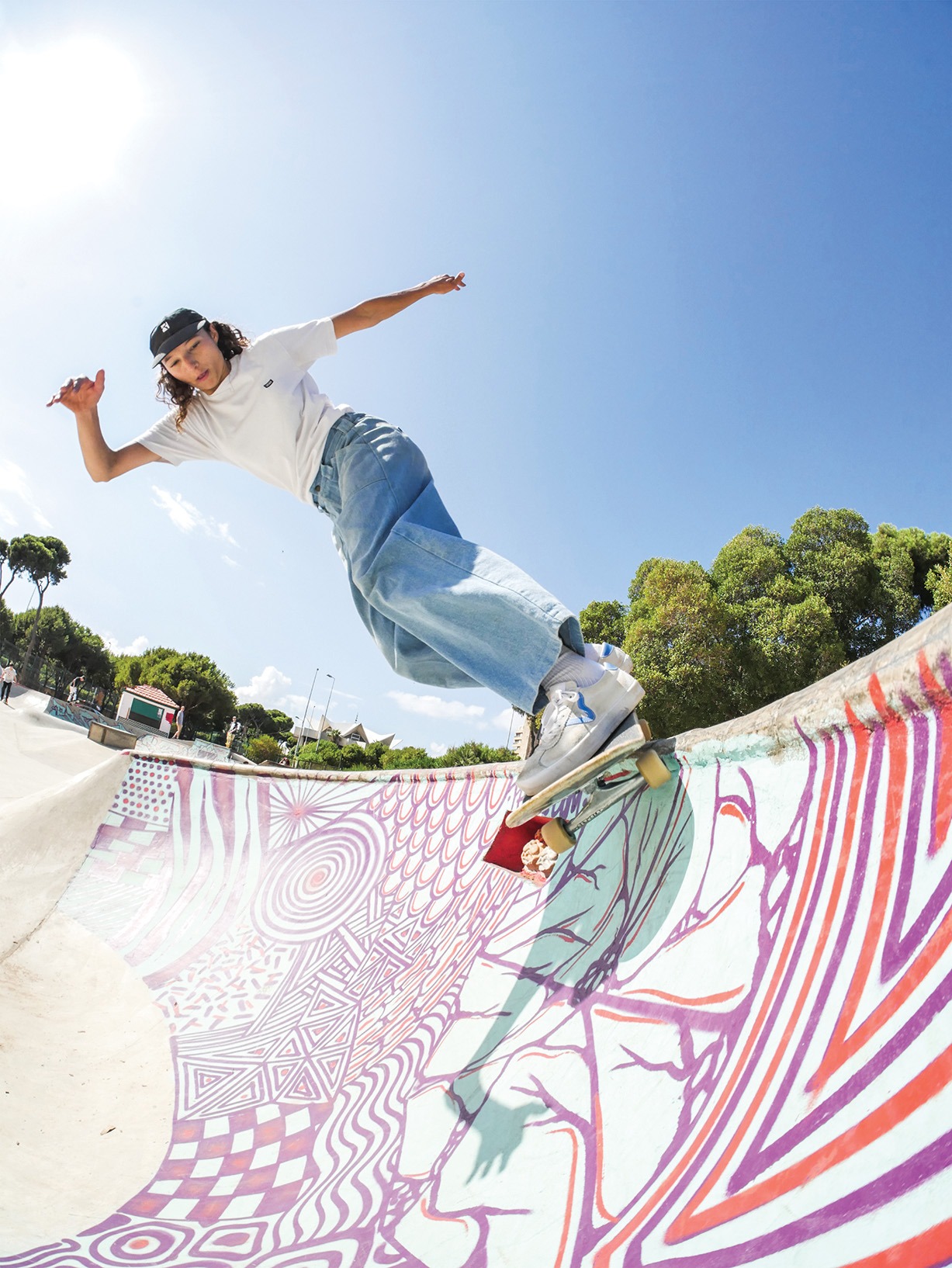
Helena Long – Backside Smith Grind ~ Photo by: Markus Bengtsson
Tensions are high on the streets of Beirut and there is a simmering heat in the air over its parks and beaches, in the refugee camps, in the falafel joints, coffee roasters and mini-marts. It is there in the unlit tunnels and abandoned buildings and in its bullet scarred statues. In my hotel room at night Lee Scratch Perry’s voice echoes tinnily from my phone speaker telling me that the city too hot, I-man have to cool off upon the hilltop, but the hills are hotter still, they echo with rifle fire and are wreathed in the smoke from burning rubbish piles. At night, seen from the waterfront, the city lights wink on and off as blackouts kickstart an avant garde light show in which stars suddenly emerge from the light pollution and then fade back into the night’s canvas as the electricity surges back, blood pumping once again through the veins of Lebanon’s capital. Even in the hipster bars and swankier eating establishments of Hamra, the talk amongst friends is of failed states, sectarian tensions and economic decline.
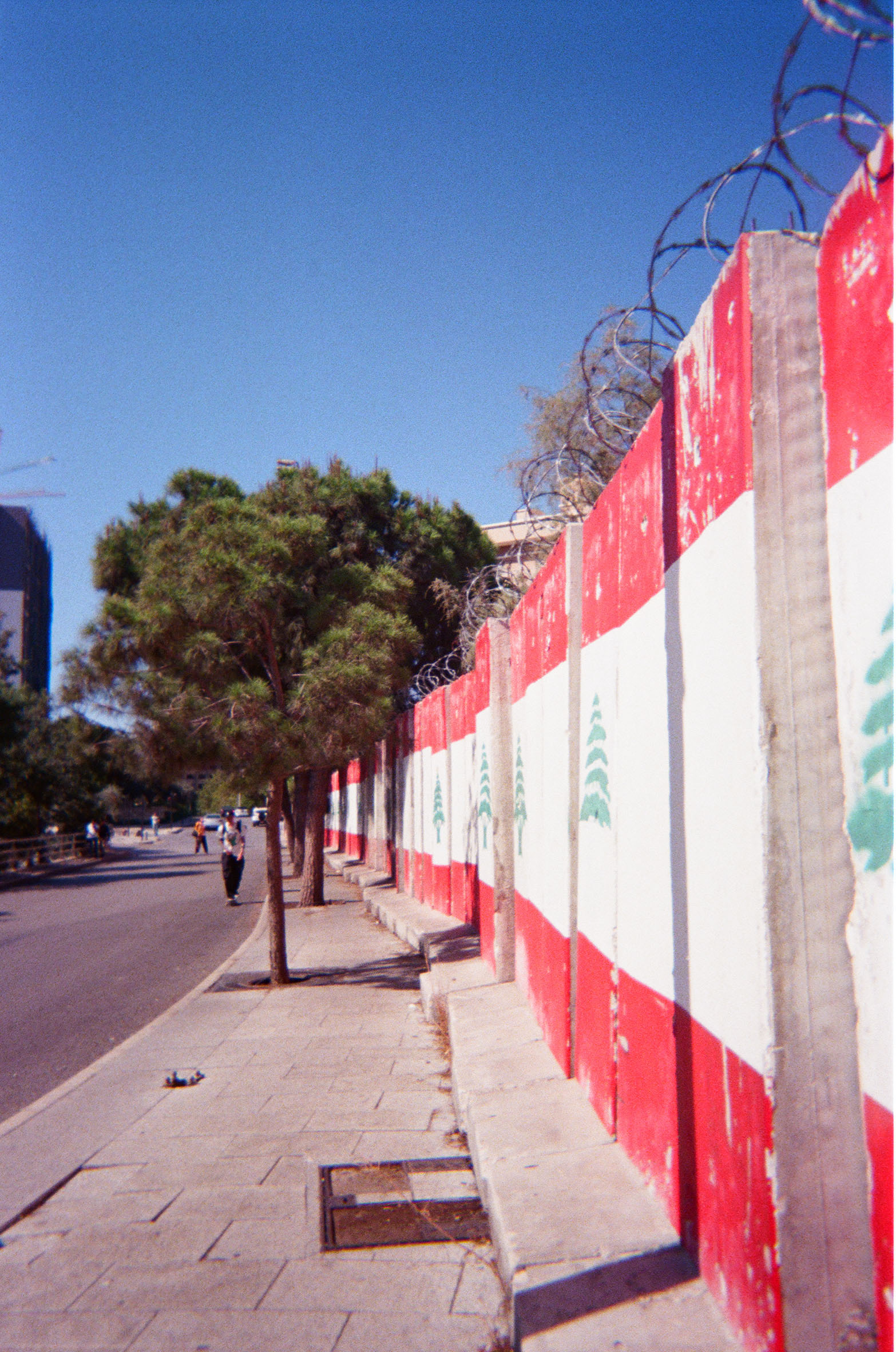
Photo by: Jono Coote
This is unsettling in part because, despite the occasional flare up (which is of course pounced upon by the media), rarely does it feel close to boiling point. Compulsive news research had left me, as it so often does, slightly on edge prior to the trip. Stories of protests, shootings and widespread social unrest had me pining for the good old days when no one had any imagination and ‘skate trip’ was synonymous with dodging pickpockets on Las Ramblas, or even staying closer to home, skating curbs and getting heckled by boy racers in car parks from Peterborough to Penzance. But of course, as is always the case, the reality is very different from the media hyperbole. Jazz bands play in lounge bars, galleries hold exhibitions, knick knacks are plied to the few tourists venturing onto the streets. In the morning, shaded from the blazing sun in the warren of city streets by office towers, mosques and the architectural remnants of colonialism and the Ottoman Empire, locals buy French pastries or za’ataar man’ouche for breakfast and chat over coffee on the pavement. Lebanon’s population are old hands at this kind of thing, and life goes on between the blackouts and shootouts. It is the ease with which you can forget the broader situation that is most jarring.
After dinner, I would often go back to my room, open a bottle of beer and read a few pages of my beat up copy of JG Ballard’s Empire of the Sun. A postscript interview discusses how his experiences in a Japanese internment camp during World War II have informed his writing since. “The reality that you took for granted,” he says, “…the comfortable day-to-day life, school, the home where one lives, the familiar street and all the rest of it, the trips to the swimming pool and the cinema,” is “just a stage set… which could be dismantled overnight.” It goes some way to explaining the dreamlike sensation that accompanies our movement through the urban sprawl. Always in the background to shake you awake, however, is the familiar sight of beggars and hawkers, the regular citywide blackouts, the bursts of gunfire whose distance you attempt to ascertain by ear as you warily sip Beirut Pilsener and argue with locals about its superior taste to the unaccountably popular liquid burp that is Almaza Lager.
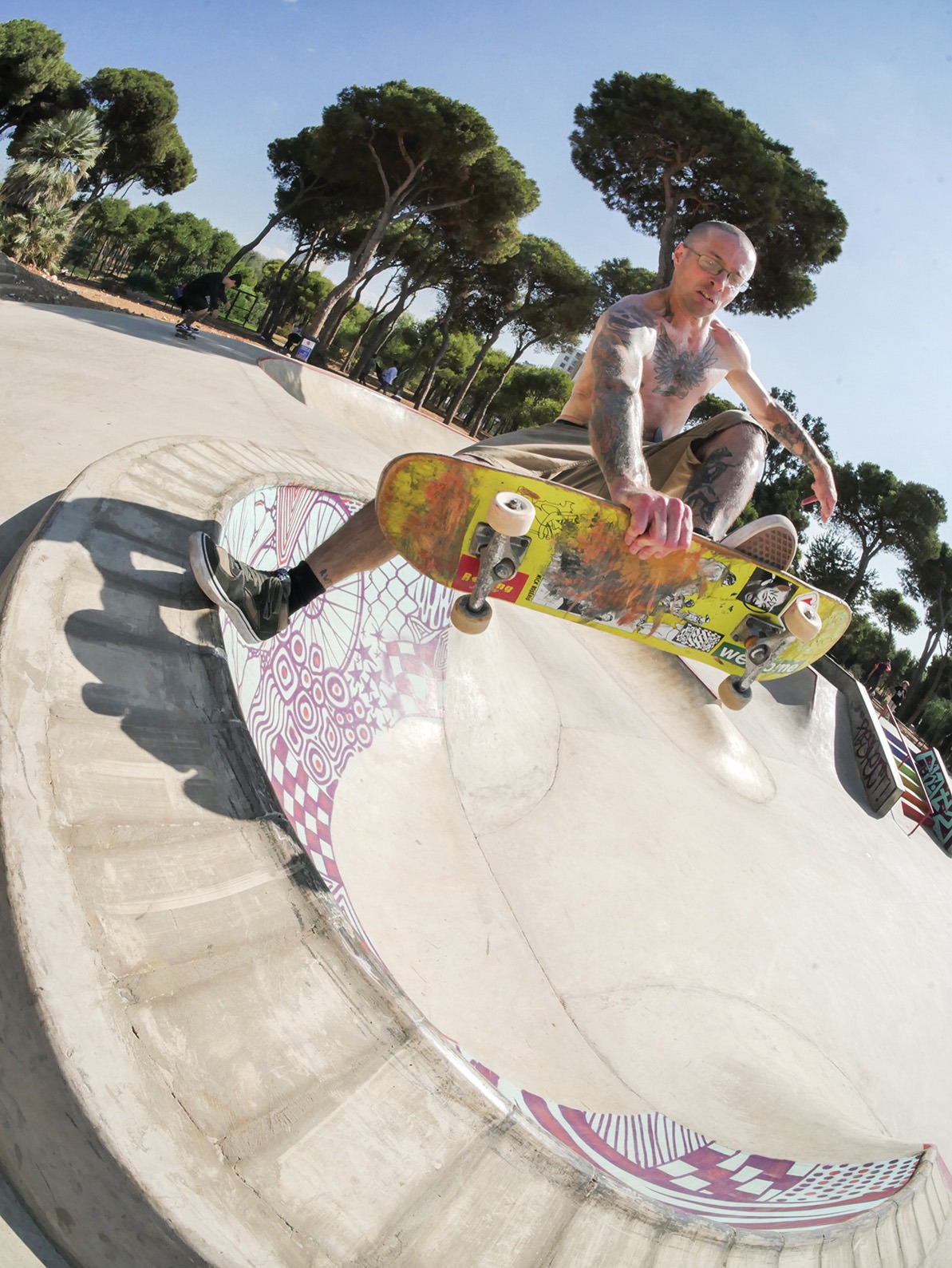
Jono Coote – Frontside Fastplant ~ Photo by: Markus Bengtsson
We arrive into this chaotic milieu late on a steamy Sunday afternoon, attempting to make some sense of the incredibly tangled web of Lebanese history and of where skateboarding’s place may be in all of it. On the plane with me are CHPO Brand founder Viktor Telégin, team rider Helena Long and filmer/photographer Markus Bengtsson. Our plans revolve around Snoubar Skatepark, the city’s first public skatepark, which was completed in July by Make Life Skate Life and a crew of volunteers. It would act as a base to explore the streets, speak to locals and generally find out as much about the place as possible beyond the revolving catastrophe portrayed by mainstream news outlets in the West. A rainbow hovers for a minute outside our plane window as we approach the city, so close to the water it seems almost to skim the waves, a surreal, childlike dash of beauty thrown into our first glimpse of an urban sprawl sprouting mushroom-like across bay and hillside. Our taxi driver tells us that he is happy to pick us up throughout the week, but will need an hour or two notice to do so – his main source of income comes from the city hospital, where he is a nurse.
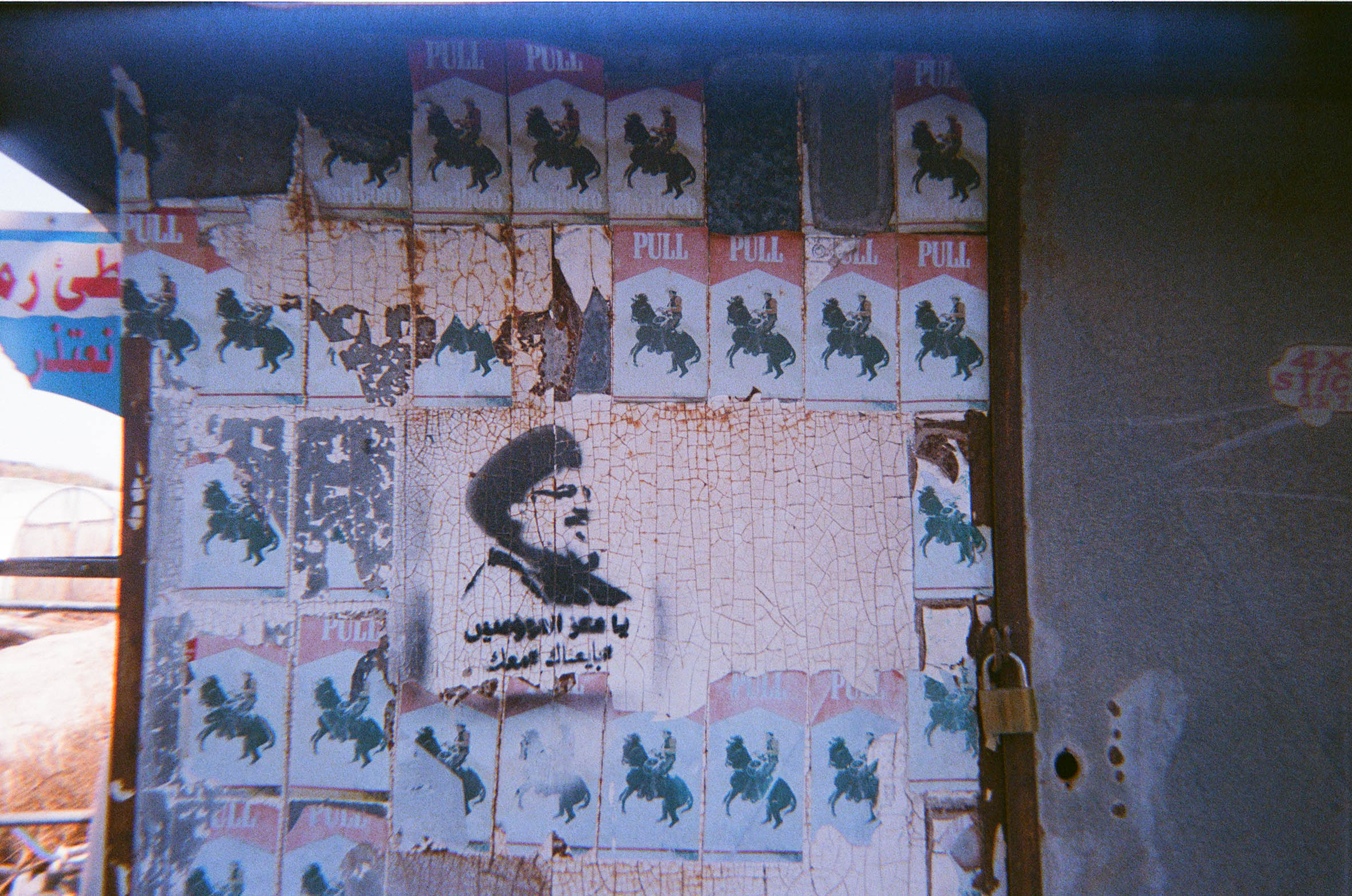
Photo by: Jono Coote
The sun is shining on our first morning as we board a local bus to the nearby district of Horsh, a nine or ten seater with an empty space in place of a passenger door. Given the lack of working traffic lights and the casual approach to road safety exhibited by local drivers, this is a more forceful wake up than even the turbo strength local coffee. The skatepark sits in a large green space just off of one of Beirut’s more hectic roads, which separates it from the nearby suburbs and refugee camps. Only a few metres from the constant roar of traffic, it is an oasis of relative calm. Kids are taught the basics of skateboarding in the morning and bats corkscrew through the skies at sundown, framed by a swollen ascendent moon as the muezzin call the faithful to prayer. Within a couple of hours of our arrival gunshots marr any feelings of serenity, but the locals are quick to assure us that this is “happy gunfire”, some kind of celebration in one of the camps. The layout itself is extensive, suitable for both the beginner and for those raised in concrete skate parks. It is an example of what should be one of the basic tenets of making a good transition based park – namely, the inclusion of transitions of varying radiuses. Nothing is more likely to cause a freefall into ennui than a park where every ramp feels the same, and clearly the Make Life Skate Life team know this; a small bowl corner with a lot of flat and an extension opens on one side into a big, mellow quarter, on the other into a driveway which in turn is usurped by a whippy bowl pocket with pool coping and a deathbox. A wide array of banks, driveways, pump bumps, ledges and funboxes lead to one end where you can aim for either the Wembley Gap and stairs, or for a bowl pocket built around a volcano built around a stone pine which juts from the skatepark like a witch’s broom embedded in the soil.

Artwork by: Viktor Telégin
The ammonium nitrate blast, which killed over 200 as well as decimating the docks and surrounding suburbs, was the catalyst for the build. MLSL saw the opportunity to do something positive after witnessing a country already on the ropes being dealt another devastating blow. In such circumstances, says founder Arne Hillen, “people still need to have fun and enjoy themselves. It’s nice to have something positive. There are always other needs, people will always need food and there can always be other priorities, but I think skateboarding can still do something for the people.” His company has built parks in such varied locations as Morocco, Nepal, Iraq and Brazil, so he has had the opportunity to see the work skateboarding can do organically in these communities and is clearly excited to see the popularity the park here is enjoying already.
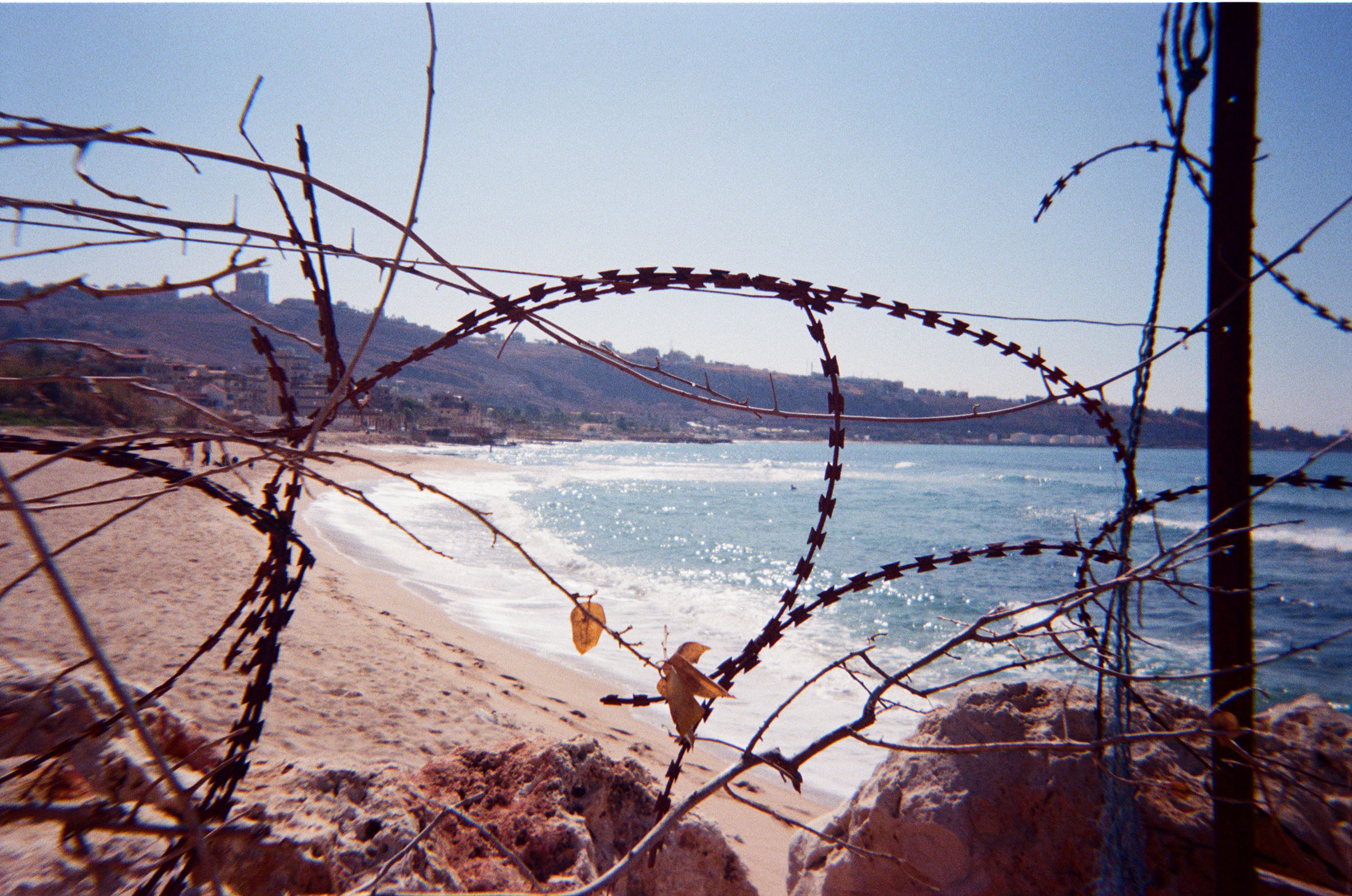
Photo by: Jono Coote
The local kids are quick to borrow our boards and roll with varying degrees of confidence around the park, squabbling fiercely over whose turn it is, and we can only shrug at the red dust and miscellaneous grime which is quickly trodden into our griptape. The build crew lament the battle during the build to fix the nearby toilets. Three times they were fixed, three times pipes were ripped out, walls were smashed and floors were shat upon with gusto. At one point, thinking I would duck in for a piss, I get within about five feet of the entrance before the smell emanating from inside drives me into the bushes. I pray to an unfeeling god that these kids haven’t paid a visit to the block before jumping on my board, or if they have that they have watched their footing. They seem, at least, pretty switched on; sweeping the park regularly, sharing sweets (if not borrowed boards), applauding each other’s successes. They are clearly benefiting from this environment, and this social aspect to skating is an essential part of how Arne saw the park slotting in with the local community;
“The possibility to connect with other people and other cultures, which we want to facilitate through the skatepark builds. This is really a melting spot at the skatepark, there are so many religions and groups within Lebanon and here everyone is mixing. It doesn’t matter where you’re from and who you are, as long as you are committed and trying to do something on your skateboard then you earn respect.”
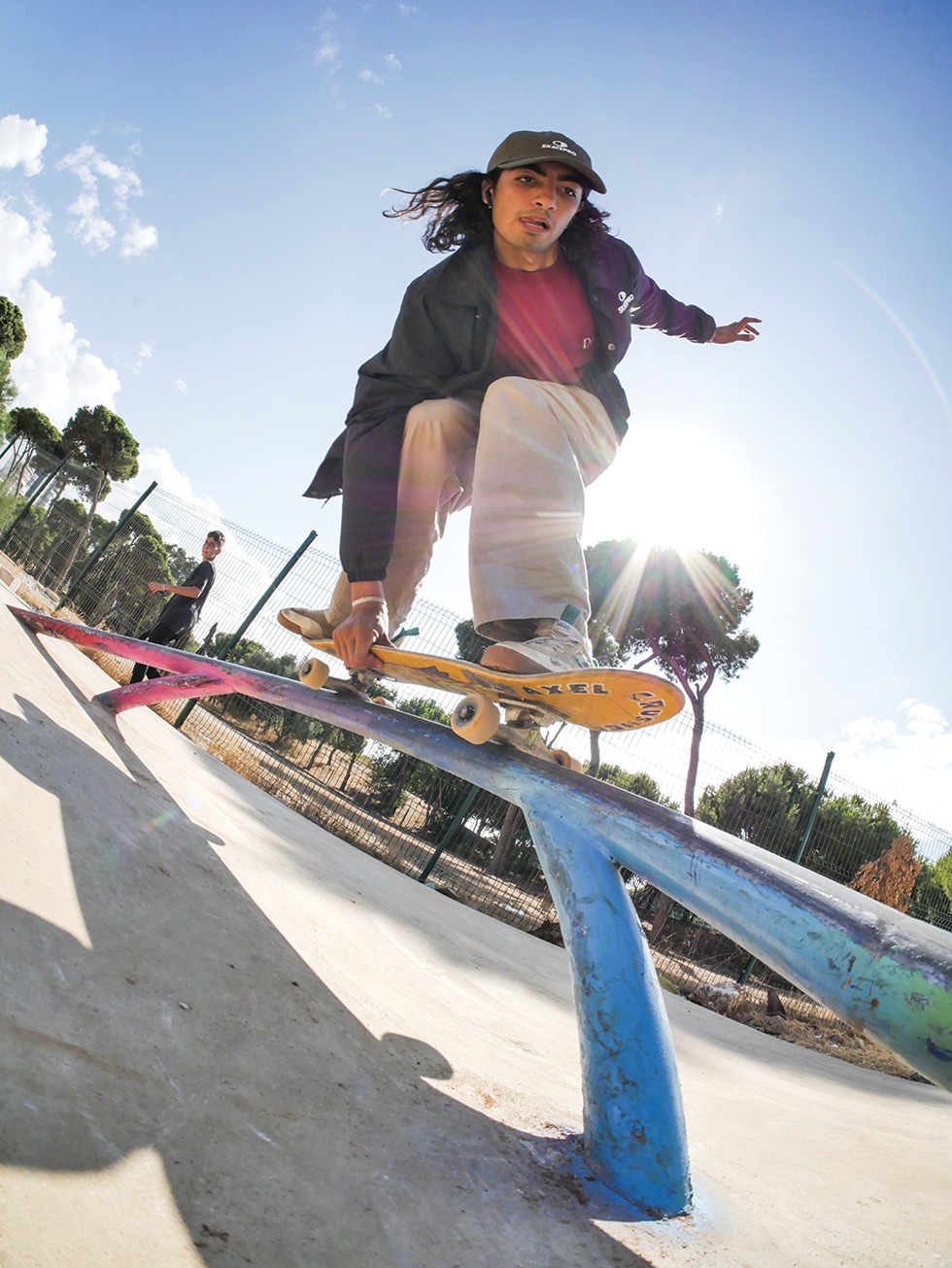
Mike Ritchard – Ride On 50-50 Grind Tuck Knee ~ Photo by: Markus Bengtsson
Away from the park, the city streets are a dissonant amalgamation of marble plazas and derelict lots, skyscrapers and razor wire. It is an urban sprawl sharply divided between night and day, with the lack of street lights turning the light from passing cars into disorientating spears of light piercing the gloom and dazzling the eye. Over dinner on the first night Samar Nuwayhid, one of the linchpins of the build crew, tells us that the discussion about Lebanon as a recently failed state is merely a construct, a handy media narrative; “It had failed before the Civil War even ended, because it was propped up by money funnelled in from the Gulf States, and elsewhere, to support various factions.” He draws a direct line between the assassination of controversial Prime Minister Rafic Hariri (an act attributed variously Syria, Israel and Hezbollah) and the current environment in Lebanon. Hariri’s face still smiles benignly from billboards, coquettish in his cap and moustache. His interests were closely intertwined with construction business Solidere, the company responsible for a lot of the more recent construction in Downtown Beirut – both the marble plazas we skate and the security guards who kick us and other undesirables out. Accusations of corruption surround discussion over the amount of money involved in letting the company destroy and rebuild what was left of Beirut’s CBD.
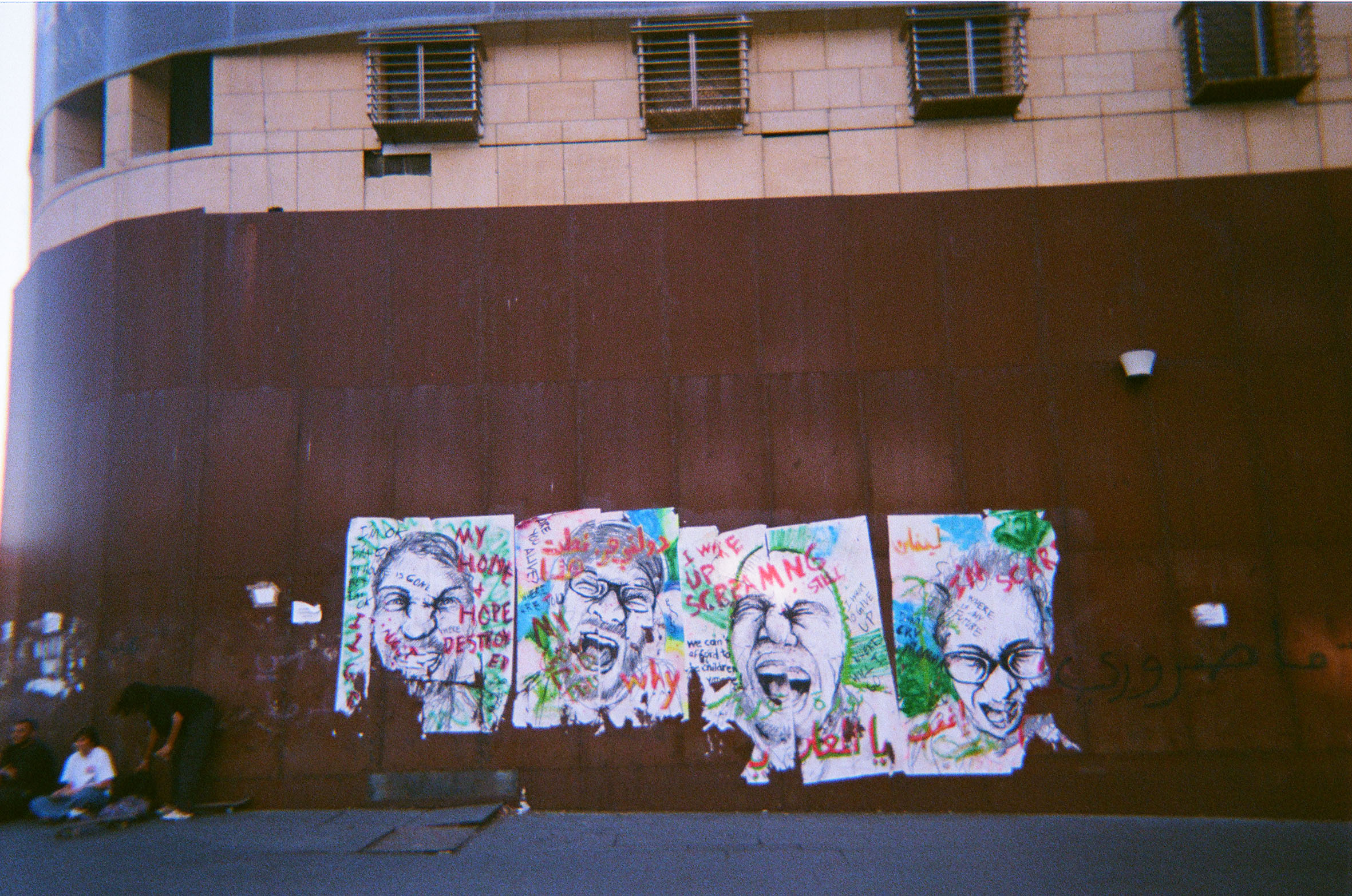
Photo by: Jono Coote
The Civil War, the string of assassinated journalists, the port explosion, the crumbling infrastructure, the desperately begging women and children who are controlled by gangs paying them a set wage and taking the rest of what they manage to get; all are different facets of the same issue, an incorrigibly corrupt political class. Samar laughs when someone comments that he should be in charge. “I would be killed straight away. Everyone has guns here.”
Our first non-skatepark stop of the trip is a set of banks dividing a busy two lane highway just off the waterfront, where palm trees sway in the breeze and the sun shines on the police and army vehicles that regularly pass by, kitted out with an array of Mad Max style armour. The back of one police cage is emblazoned in a pleasingly direct manner with the words ‘DANGER POLICE’, but they are clearly too busy or disinterested to worry about a group of idiots with skateboards playing in traffic. We wind through the streets adjacent to the waterfront, finishing up at a marble plaza which seemed too good to be true – and was indeed apparently an instant bust until the landowner ran low on funds and couldn’t afford security for the entire area. Now it belongs to the skaters and feral cats, but is also well used by non-skating locals. Tanned running groups stretch on the blocks, couples on dates stroll through, groups of friends sit with coffees, it feels almost like a public square despite the fact that, like much of the city, it is privately owned. With security cut due to funding issues, however, it is slowly being reclaimed. The skatepark, says local skater Ahmad Beresh, is the ideal back up “when we get kicked out of every place in Beirut. Now we have this and there are new people coming in every day.”
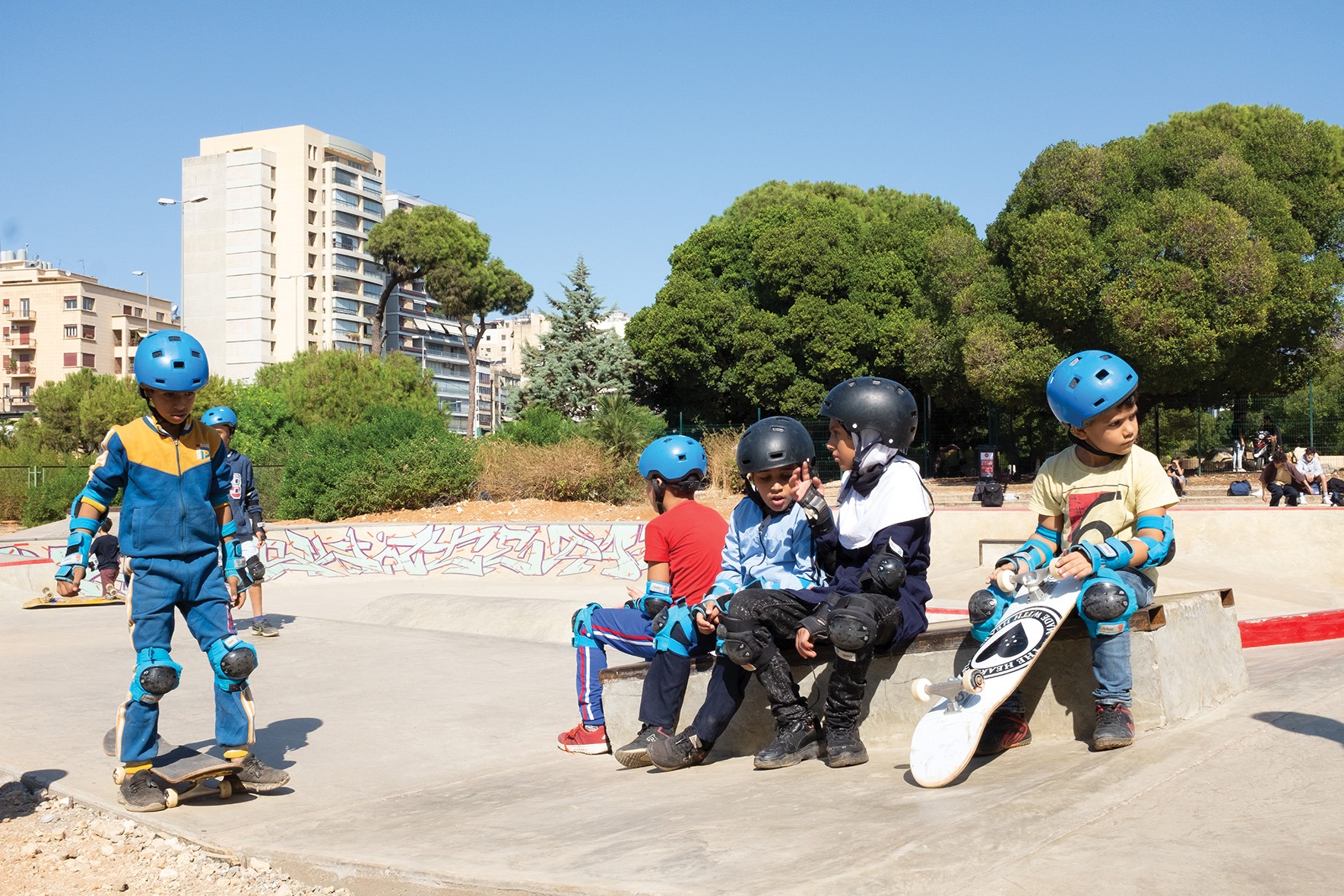
Photo by: Markus Bengtsson
Mike Ritchard, our guide, agrees; “The skate scene here, we still go skate street. Skaters are always going to skate street, but when you’ve been kicked out of every street spot you still have the skatepark for everyone – to skate anytime and do whatever you want.” Mikey is 18 and was heavily involved with the skatepark build. He teaches lessons to the kids at the skatepark a couple of times a week, and is appreciative of the choice that the park offers the scene; “Before I had to teach them at spots, I could only show them tricks – now I can teach them to drop in, to carve, to roll down a bank.”
The variation that the park has brought is welcomed, but its inhabitants are fiercely protective of the street skating identity it has always held. Reem Taha, one of the older figures in the local skate and DIY music scene, is appreciative of the park but “I would still say I prefer skating street. The diversity, the interactions, the conflict that happens as well, it’s different.” She points out subcultural landmarks to us as we wander the city streets – the abandoned building which once hosted the first punk and metal venue in Beirut, spots where her crew would meet to skate, places lodged in the fabric of the city’s skate and music scene, the beating heart of youth led counterculture which must be the crucible for change if it is to come. She talks of skateboarding as a leveller, something “…which gives people of a poorer class the opportunity to be out on the streets doing something that’s cheap. It creates a space in which we can share and be together, even though we’re of different backgrounds, different social classes, different nationalities, ideologies, belief systems.”
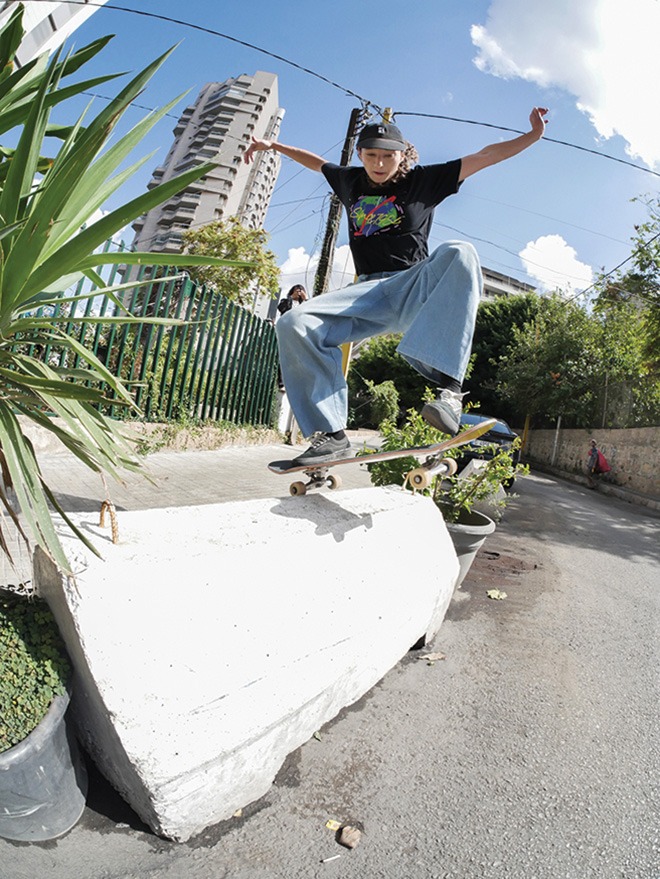
Helena Long – Wallie ~ Photo by: Markus Bengtsson
“It changes the view of what a woman can dress like, be like, engage in,” she muses on her own discovery of skateboarding on the city streets, “and when I started it was such an outlet for energy, aggression and rebellion. It felt almost like a reclamation of the streets. It could be an oppressive environment growing up in Lebanon, women were expected to be a certain way so I got a lot of abuse, but that somehow made it feel as if I owned the streets.” This sense of ownership is worth noting, in the midst of a situation where it can be only too easy to feel powerless, helpless, adrift in a sea of corruption and entropy. Skateboarding as empowerment, skateboarding as a middle finger to the institutions which have taken everything and given nothing. Many people talk to us during our trip of returning to the country after saving money abroad, only for the banking system to collapse and their life savings to be reduced to an existence only on paper. Violence between gangs, high on the fumes of religious righteousness, is constantly threatening. Tobacco is seemingly the only industry which is booming.
One morning we catch a taxi out to a beach south of the city as the water in the bay is far too toxic, it is tainted with chemical and effluent and reflected at dusk you can almost see the diphtheria and dysentery, the typhoid and cholera, when the sun performs its technicolour hari kiri into the horizon. Dropped off on a dusty side street by a mosque, we find a stretch of sand fringed by barbed wire, deserted apart from a couple of fishermen and a few small lizards which flit amongst the rocks. We have been there for about an hour, surfing, sunbathing and roaming the beach, when we start to hear isolated shots cracking in the hills. Sporadic gunfire grows in intensity and volume and our jokes take on a slightly nervous tone, but we are calmed by two middle aged men who plod their way onto the beach carrying plastic chairs and a parasol before relaxing with audible sighs and cracking soft drinks. We won’t worry, we reason with each other, until these guys look worried.
A guide to driving in Beirut:
- Indicating is not mandatory, and if you do then it doesn’t necessarily have to indicate the direction you actually plan on going in.
- Use your horn regularly, randomly and with gusto, regardless of whether there is anything nearby deserving of the sound.
- Wait at the city’s three remaining sets of traffic lights, unless you don’t want to.
- Make sure you play a mean game of chicken.
Our hunch was correct; we leave the beach unscathed and catch one of the crowded ten seater buses back to the city, a bizarre journey which sees the vehicle pull up sharply at impromptu underpass bus stops and at one point stop on the edge of a junction slip road to drop a passenger off. At one point a car flies past, boot wide open but tied on with some rope, and at least four men nonchalantly sat behind the other passengers in the seats. The route ends next to two huge bin fires, a homeless encampment and some kind of bunker with a bored looking soldier sat inside. Children play under the bridge, rolling an abandoned tire along the rubbish strewn grass, and weathered faces ask in shouted Arabic where we are going. We jump in a taxi and are soon back by the waterfront, next to a large and expensive looking restaurant complex where couples stroll along the promenade sipping Starbucks and debating dinner plans. The juxtaposition produces a mental whiplash whose closest comparison we collectively have is to be found in the slums and adjacent high rises, the sharp economic divisiveness, of the USA.
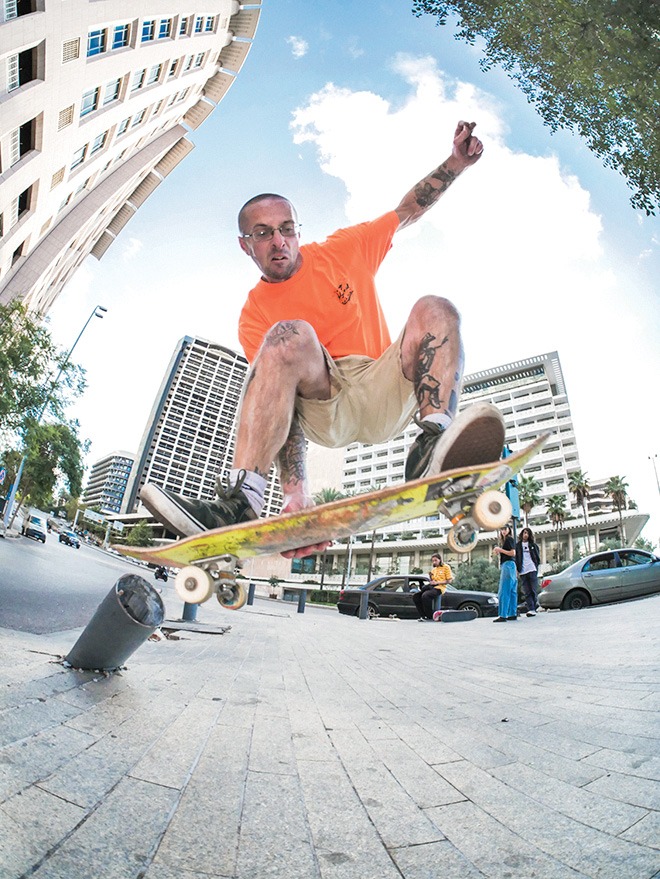
Jono Coote – Pole Jam Stalefish Grab ~ Photo by: Markus Bengtsson
The following day we skate through some of the buildings which didn’t weather the economic downturn, abandoned bars and graffiti reflecting the anguish of a nation only a block or two from the iconic Mohammad Al-Amin Mosque and the bullet riddled statues of Martyrs’ Square. Mikey is keen to give us the full Beirut spot experience, and we hit multiple plaza spots as we dodge security guards and lurking groups of bored teenagers. We search fruitlessly for a DIY spot in an abandoned cinema, its walls caved in and its pillars teeming with graffiti and bullet holes. At Raouche Rocks we watch the flaring of atmospheric particles into abstract brushstrokes of colour as the sun reddens and slumps into the sea. Tourists snap selfies, bats pinwheel through the air on the hunt for insects and mopeds adorned with flashing LEDs buzz back and forth between road and pavement. Sports cars drive past slowly blasting trap and techno like they were in LA. People walk past with paper takeaway bags emblazoned with the slogans of local and international chicken vendors. The best of all belongs to Deek Duke, whose slogan ‘All Chicken No Rules’ I clock on the first day and upon which my mind fixates for the rest of the week. We are on a trip with a proudly vegan company and I’m happy to play by those rules. On top of this, the sketchy electrical situation makes me wary of any meat and its potential lack of refrigeration. Still, I find myself waking up in the early hours with a deep yearning, my mind teased by thoughts of succulent, rebellious poultry, a distant whisper emerging from the noisy clutter of the air con; “All Chicken, No Rules”. Sometimes we are skating a spot and I realise that I’ve been staring at the same spot in the middle distance, vacant, my head a hollow shell, those words scorched upon my frontal lobe, a linguistic lobotomy. Sometimes someone will clock my reverie, ask “What are you thinking about?” “Oh, nothing,” I say, stepping over an abandoned Deek Duke bag as I get back on my board.
On our final day we return to the park ready for a low key opening event, getting in early to avoid the crowds and sneaking in a good skate before the 11am skate lesson takes place. Boards are taken from the lock up and handed to children from the nearby refugee camps. Older local skaters teach them basics, leaving room for the more freeform aspects of play. I introduce them to the sight of someone drinking a pre-11am beer, preparing them for future skate trips and the expected etiquette. The teaching programmes started as the construction was finished and now runs three times a week, giving these youthful refugees an outlet they wouldn’t otherwise have and which they clearly relish.
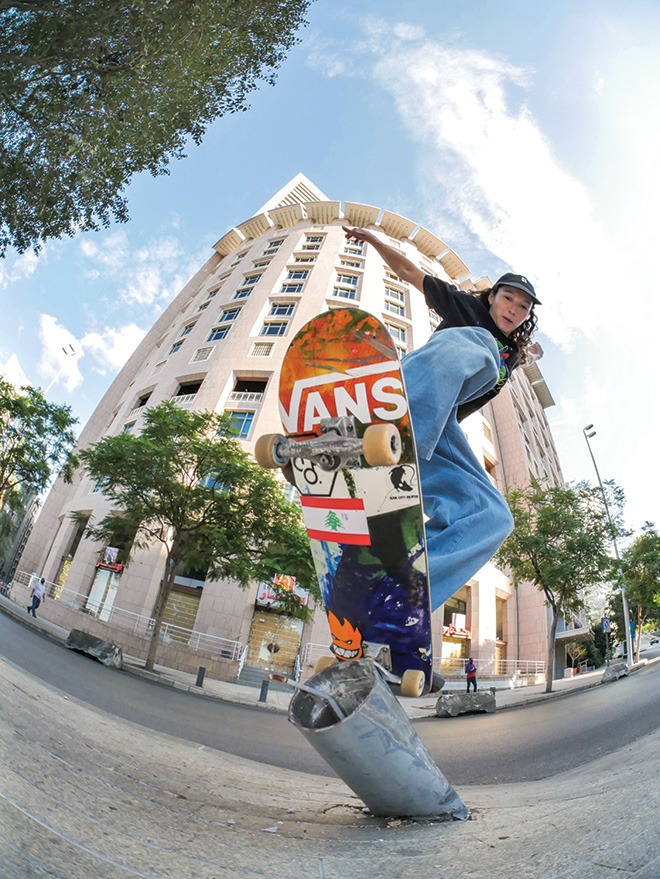
Helena Long – Switch Pole Jam ~ Photo by: Markus Bengtsson
The lessons finish, the number of park users swells, and we head across the main road to grab lunch in a neighbourhood where we are advised to be on our guard. The others had been here on our first day, returning slightly shaken with tales of nearby gunfire, but today the residents slump under a heat induced torpor. Even the revving engines of mopeds, a constant in Beirut, sound tired. Cats lounge in front of stores, the falafel vendor offers us a couple of free spinach pastries alongside our lunch, a small child pleads to have a go on my board. He immediately slips out and sends it straight into the ankle of an elderly woman, who berates the child and gives us a look that says more than words ever could about what she thinks of us. She carries on down the dusty street, muttering under her breath the whole way, and we quickly head back to the park before we can be singled out as the enablers in this scenario
For some reason, between the open session and the actual skate jam, there is a two person circus troupe giving a juggling show. We take advantage of the downtime to hop a couple of fences, dodge piles of greybrown effluent lovingly tended by swarms of plump, well fed flies, and check out what looks from across the park like a 70s snake run. It turns out to be a series of dirt covered bumps which would need a good sweep to be made skateable, but in any case the nearby kids excitedly commandeer our boards immediately to the grateful appreciation of a tired looking group of mums in the shade. After showing them the rudiments of standing on a board without breaking anything, we head back to watch the chaos unfold. The event is turning into a roaring success, with skaters of varying ability levels chucking themselves at whatever obstacle the session is taking place on. After watching multiple handrail-based genital mutilations, I notice the parents from the bumps watching on, looking markedly less enthused than earlier about getting their darling children skateboards.
There is only one morning where the weather stops play and, looking for something to pass time until it dries up, we are reminded of a poster we saw the night before for an exhibition on Arab Comics. This turns out to be one of the most enlightening parts of the trip. The artwork on display tells stories of collectivisation and fighting censorship, asylum and diaspora across the Arab world; but also the personal alongside the political, the humorous, the satirical, and, for those comics without translations, sometimes the plain baffling. I would discuss the connection between art, skateboarding and conflict with Reem the next day; “Wherever there is struggle, there is room to be creative and value the simple things in life. Maybe it gives you some courage to try things you’ve never tried before; not just in skating, the best poetry comes out of struggle, the best music. Wherever there is conflict, there is potential.”
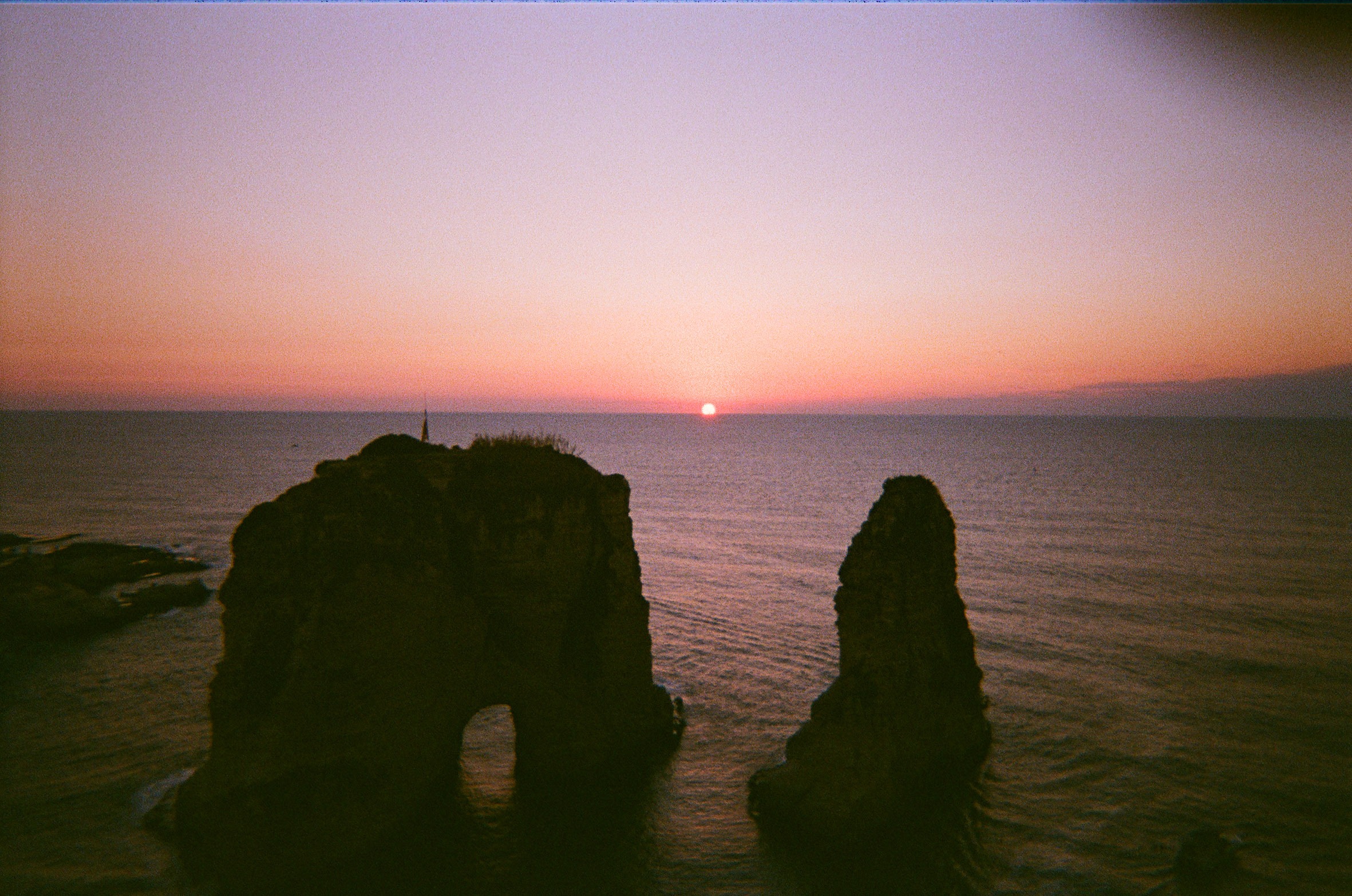
Photo by: Jono Coote
The pan-Arab spread of artists on display, the interconnected nature of the work they create and the issues which influence that, reminds us of the sheer futility of trying to explain Lebanon’s issues in a bubble separate from other countries in the area. It is a geopolitical array of problems which sees complex temporal and spatial issues focused suddenly and shockingly down to one moment, one street, one bullet. It is not for me to lazily describe the Lebanese mood as ‘stoic’ – people are angry, upset, sick of the shit being heaped upon them, they are in many cases moving abroad if that option is open to them, it does a disservice to throw around glib epithets. Like people anywhere, they are susceptible to partisanship, feuding and mindless violence. But, similarly, they have weathered civil war, endemic governmental and corporate misconduct, the meddling of many of their neighbour states and that of countries further afield to boot; and, after all of that, the population is still welcoming, still standing, still cutting their anger with a dose of stubborn positivity. It says a lot of a population so repeatedly scarred by trauma upon trauma that they still scatter cat food on their porches, offerings to the multitude of feral cats which haunt the streets – though, judging by the size of a dead rat we gingerly step over one day on a roam through the city, bloating even as it fell in on itself, a slow, imploding decay – food sources are not the felines’ biggest issue.
Skateboarding is more than just an escape from the realities at hand. If it can help draw people together, connect and start to empathise with others as people rather than symbols of fear and the unknown, surely it is essential. Like the companionship and creative and political outlet these illustrators found through drawing, skateboarding can draw people together and help disseminate ideas and opinions in a fashion unmonitored by the combination of the corrupt and the greedy who make up the Lebanese establishment. Through play, creative outlets can be found and mutual interests shared on a street level which surmounts the divisive games that politicians play. This four wheeled plank is universal, it transcends cultural differences and that is what gives it such incredible potential for change in a place as divided as Beirut.
Thanks to CHPO Brand and Viktor Telégin, Markus Bengtsson, Helena Long, Mike Ritchard,
Arne Hillen and Make Life Skate Life, Ben at Jean Jaques Distribution, Samar Nuwayhid, Ahmad Beresh, Reem Taha and everyone that took the time to talk to us, show us around, skate with us, help us decipher the ever shifting social milieu of where we were or generally just make us feel welcome. All Chicken, No Rules.
WHEN LEAST EXPECTED – CHPO Brand x Make Life Skate Life
Filmed & Edited by: Markus Bengtsson
Markus Bengtsson thanks: Make Life Skate Life, CHPO Brand, Vague Skate Mag, Hyper Market, Big Ray, Mike Richard, Johanna Åkerström + Viktor Telégin



